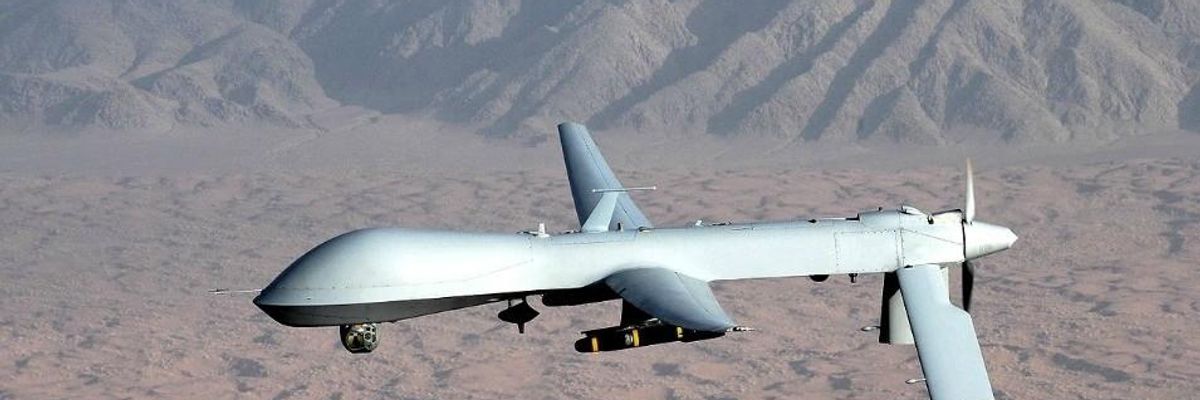Facing unrelenting criticism over the U.S. withdrawal from Afghanistan, the Biden Administration is insisting that the United States will maintain a capability to launch airstrikes in Afghanistan, regardless of the legal limitations and possibility of perpetuating the war.
The Biden Administration vows to keep in place an "over-the-horizon capability," meaning that the United States will still be able to strike targets in Afghanistan from its military positions outside of the country.
"This war has no legitimacy anymore. It's just a struggle for a balance of power, dispensation of power between various factions, and no Afghan, especially civilian Afghans, should die because of that."
"There isn't a scrap of Earth that we can't reach out and touch when we need to," Secretary of Defense Lloyd Austin remarked in comments to the press last week.
As part of the twenty-year U.S. global war on terror, the United States developed the capability to quickly launch airstrikes against many countries around the world. Officials say the U.S. military is currently exercising an over-the-horizon capability in several countries, including Libya, Yemen, Syria, and Somalia.
"We run effective counterterrorism operations around the world where we know terrorism is more of a threat than it is today in Afghanistan, without any permanent military presence on the ground," President Joe Biden acknowledged in a speech last month. "We can and will do the same thing in Afghanistan with our over-the-horizon counterterrorism capability."
Now that the Taliban has taken control of Afghanistan, it is unclear whether the United States can legally exercise an over-the-horizon capability in Afghanistan, and it's unlikely that the Taliban would permit the United States to launch airstrikes in the country, as the previous Afghan government had done.
Upon entering office, President Biden placed limits on counterterrorism drone strikes outside of conventional war zones. With the war in Afghanistan ending, the same restrictions could apply to Afghanistan, leading administration officials to rethink their plans.
For years, U.S. officials have justified airstrikes by citing the 2001 Authorization for Use of Military Force, which permits the President to use military force against the perpetrators of the 9/11 terrorist attacks.
Some officials have grown increasingly critical of the resolution, especially over the manner in which U.S. Presidents have used it as a dubious legal basis for the "forever wars" of the post-9/11 era. In a Congressional hearing last month, some members of Congress called for the use of force authorization to be repealed and replaced.
"The '01 [authorization] has been stretched beyond all recognition, in terms of its scope and reach, from what was contemplated when it was initially adopted," said U.S. Senator Chris Coons, Democrat of Delaware, in the hearing.
Periodically, the United States has set aside issues of legality to conduct airstrikes that have violated international law. A notable example is the cruise missile attack that the Clinton Administration launched against targets in Sudan and Afghanistan in 1998.
Critics warn that airstrikes can cause tremendous harm, especially to civilians. Whistleblower Daniel Hale, who leaked classified information about the U.S. drone wars to The Intercept and is now serving a nearly four-year prison sentence, has repeatedly warned about the risks to civilians.
"When I finally left the military, still processing what I'd been a part of, I began to speak out, believing my participation in the drone program to have been deeply wrong," Hale reflected in a letter that he wrote about his decision to blow the whistle.
In the twenty-year war in Afghanistan, thousands of civilians have been killed in airstrikes, with 700 killed in 2019 alone. Yet, no high-level U.S. officials have ever been held accountable for their role in directing attacks that have killed Afghan civilians.
Amid the chaos of the withdrawal from Afghanistan, the U.S. military exercised its over-the-horizon capability in a way that demonstrated the dangers of the approach. Following the terrorist attack at the Kabul airport on August 26 that killed an estimated 200 people, the United States initiated drone strikes against targets without fully knowing who it was targeting.
On August 29, a U.S. drone strike killed ten civilians, including seven children. U.S. military leaders claimed to have targeted terrorists, with U.S. Chairman of the Joint Chiefs of Staff General Mark Milley calling it a "righteous strike," but an investigation by The New York Times found no evidence to support these claims.
The man targeted in the strike was Zemari Ahmadi, an employee of a U.S.-based aid group that provides food and assistance to poor Afghans. Ahmadi was seeking refugee resettlement in the United States for himself and his family.
President Biden has said that it is time to end the "forever war" in Afghanistan, and after the drone strike that killed Ahmadi, he insisted that "the war in Afghanistan is now over."
Some officials have quietly supported the President's decision, despite the widespread criticism that he has faced from the U.S. foreign policy establishment.
"This war has no legitimacy anymore," U.S. Special Representative Zalmay Khalilzad commented last month at the Aspen Security Forum. "It's just a struggle for a balance of power, dispensation of power between various factions, and no Afghan, especially civilian Afghans, should die because of that."
By maintaining an over-the-horizon capability, however, the Biden Administration is bowing to its pro-war critics and continuing one of the cruelest aspects of the war, the deadly air campaign, which has already devastated the lives of so many Afghans.

